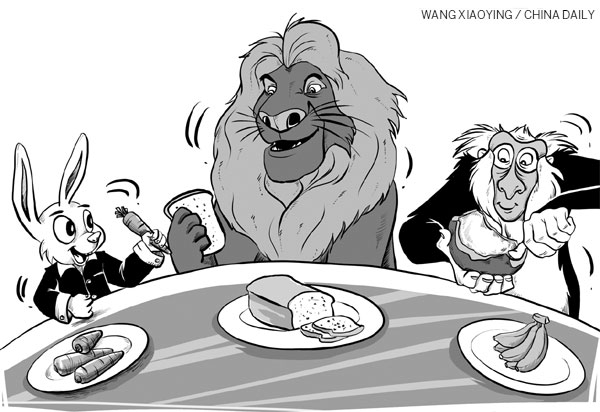
President Xi Jinping has breathed new life into Chinese political imagery with his recent statement that China is a "peaceful, pleasant and civilized lion", paraphrasing Napoleon, who described China as a sleeping lion whose roar would one day shake the world.
Lions in the wild are dangerous but endangered, yet the mighty roar of the lion lives on in the mind of children and adults alike. Although unknown in the flesh to most people walking the Earth, lions continue to fire up the imagination of people around the world. The international success of The Lion King as an animated film and stage drama is a contemporary manifestation of that craze, as are the gentle lion Aslan in the Narnia tales by C.S. Lewis and the couragechallenged lion in L. Frank Baum's The Wonderful Wizard of Oz. And lions have been with man from the beginning; they feature prominently in ancient cave paintings, ancient folklore, Aesop's fables, as well as contemporary political iconography.
Lions were first depicted with awe in cave paintings dating back to 30,000 years ago, when the precarious balance between man and beast had not yet swung clearly in man's favor. Ever since the rise of civilization, lions have proved potent symbols, from the Sphinx in ancient Egypt to the Leo in the GrecoRoman zodiac to the symbol of state power in ancient Persia. In ancient Babylon the lion was associated with kingship, in the biblical Old Testament it appears as a judicious beast, sparing Daniel, but not his tormentors.
The lion, while not known to be native to China, makes a notable appearance with the spread of Buddhism during the Han period and then emerges as part of a more distinctly Chinese tradition in the form of malefemale guardians sitting astride gates and entranceways. Lions wrought in stone as paired guardian figures are a familiar sight in other parts of the world, too, whether it be the entrance to the New York Public Library, colonial Britishstyle buildings and banks or in front of sprawling shopping plazas.
Lions may mean different things to different people in different cultures, but there is a telling consistency in how they are characterized. It is generally observed, across the map and over the centuries, that lions are fierce yet serene, adept at killing yet restrained, keen at keeping enemies at bay while steadfast in protecting the home turf.